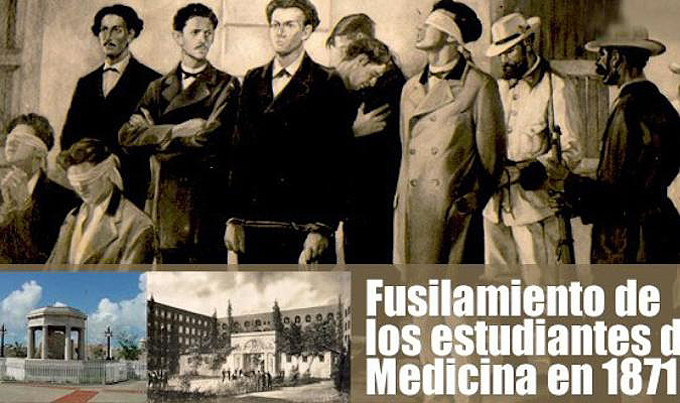It is the century and a half of the most abominable crime of the Spanish metropolis in Cuba: the execution of eight first-year medical students on the esplanade of La Punta, on November 27, 1871 . No other colonial atrocity had such profound repercussions as this one, nor such permanent disapproval in memory. Some will think, with reason, that the Reconcentration dictated by Weyler at the end of the war of independence was an even more brutal event, but it is that this fact must be considered for what it was: a genocide. There were also multiple executions of expedition members and patriots, the extermination of entire families ... there was everything. Even so, the events of November 27, 1871 marked a milestone: that of the empire of barbarism and unreason.
In the midst of silence and terror, in the midst of the howl of the fundamentalists of the Volunteer Corps, in the midst of sadness and pain, every honest Cuban and Spaniard of that time must have felt a deep contempt for the government that committed such acts. That date has never been commemorated since.
Two Cubans, José Martí and Fermín Valdés Domínguez , fraternal friends, left a record of this.
The matter, in the case of Fermín, touches him extraordinarily closely: he is also one of the students prosecuted in the trial-farce against the students and could have also been one of the martyrs, even though he did not stop being a victim, since Fermín was sentenced to six years in prison along with other of those students, he was locked up in the Royal Prison of Havana and later assigned to the cleaning and maintenance service of the Quinta de los Molinos, the summer residence of the Captains General of the Island, so until the escape of one of them determined the return to jail. Only later would the royal pardon and deportation to Spain arrive. Forever those events were marked in the life and memory of Fermín, which committed him to himself to investigate and expose with impartiality in order to prove the total innocence of the executed students.
In Madrid, Fermín meets Martí, who had arrived earlier and has been aware of events.
It is Valdés Domínguez who writes:
Although my pen has to stop sometime to let a tear run, and the souls who live on miseries want to slander me, I will not be the one who recoils from the idea of narrating the facts in all their simplicity so that they serve as a guide to the story when it is try to judge the saddest episode that you have to record in your annals, and whoever has great and uplifted feelings can appreciate how the grave was opened to eight children and how thirty-one went to the galleys of the Presidio.
But I must state that, if a sentence of six years in prison has weighed on me, if I saw my elderly mother die of anguished grief, I will make sure that these memories do not influence the painful relationship of the events.
(In the notebook November 27, 1871 , with numerous editions from 1873).
Valdés Domínguez, let's not forget, reached the rank of colonel in the Liberation Army and served as a physician-surgeon and journalist. History remembers and honors him as the defender of medical students and who first publicly proclaimed their innocence.
José Martí is, for his part, the author of an extensive poem that is not among his best known. It is entitled "To my brothers who died on November 27," and from it we extract this dramatic stanza:
On a heap of torn bodies a
legion of hyenas is unleashed,
and fast and hungry,
and of greedy human beings,
the blood drinks and the dead kills.
Plunging
its cutting claws into the corpse , it
buries
the disgusting head in the shattered entrails ; inside the chest
the teeth sink sharp, and with blind
horrible movement it wiggles,
and firing fire from its eyes,
radiant with fear, then it raises
its head and neck in red blood;
on either side,
his stupid gazes wander,
and with pleasure he bends, and roars, and jumps
and, breathing the bloodstained air
with barbarous delight, he delights.
Thus upon you,
- living corpses
sad slaves of wicked people, -
the hyenas in legion unleashed themselves,
and in breathing the reddened blood
with barbarous relish they rejoiced!


Deje un comentario